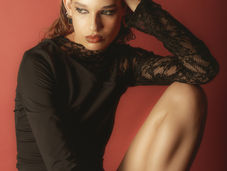An Evening in the In-Between: Bi+ Lines at the National Poetry Library
- Anainah Dalal
- Dec 14, 2023
- 4 min read

Photo by Anainah Dalal
So often, in art and all that surrounds it, we tend to get caught up in binaries. Binaries of meanings and intentions; right and wrong; beautiful and ugly; relevant or not; successful or not; art or not. There is nothing I dislike more than this last sentence you just read. While often useful in solving conflict and making decisions, I feel such binaries have no place in art. Art exists in the in-between, and poetry, like all art, produces some of its most touching pieces when it embraces that in-between. It is this very concept— of in-betweenness— that is celebrated in the book Bi+Lines: An Anthology of Contemporary Bi+ Poets and was the forefront of the readings and panel discussions held at the National Poetry Library on the 6th of December.
The night consisted of multiple readings by three of the featured bi+ writers in the anthology— Troy Cabida, Maria Ilona Moore, and Rona Luo— as well as an introduction and panel discussion by editor Helen Bowell and publisher Ben Townley-Canning. Introducing the book, Bowell focused on the theme of in-betweenness, and how all of the poets included address the result of living within imposed binaries and categories— not just of sexuality, but also of race, class, gender, and disability. Each of the poets’ readings addressed living and contending with the liminal spaces of the world around them— be it in the joys and perils of bilingualism as in Maria Ilona Moore’s bodies of water or in the gaps and silences of Rona Luo’s On Meeting my Husband’s Lover during the Pandemic. Watching all three poets perform was a pleasure, the depth and emotionality in each of their works distinctly evident in the care and passion with which they performed and spoke about their works. And even when there were silences— as there were in between Luo’s performances (they asked us not to applaud)— I could feel the weight of their words seep and settle into my mind and heart. As someone who constantly lives in a liminal space of contradiction and not-knowing, hearing the words “being in the in-betweenness of life is not indecisiveness, just being” from the speakers felt like a warm hug I will cherish in these cold winter days.
The panel discussion that followed the readings was just as insightful, touching upon questions of editing and collating the anthology, funding it and the impact the project had on each of the collaborators involved. Bowell’s charismatic personality and passion for telling bi+ stories came across distinctly on stage, where in talking about the process of editing and putting the anthology together, she accepts the struggles of having ‘imposter syndrome’; learning to understand that despite one’s opinion not being the opinion, it still holds value. She talked of how seeing the value in others’ work does not diminish her own, but rather informs it— a wonderful take on issues the other poets (and I too) saw themselves having. Bowell’s further commitment to the craft was made evident when Townley-Canning emphasised her role in making sure all of the poets were paid and that adequate funding was asked for and received for the project. It was reassuring to hear that Bowell was so unwavering in her support of new, queer poets, and that the insistence on poetry being paid was successful. There is a certain scepticism to the monetary value of poetry— as the speakers agreed— and while it is not a benchmark of good poetry, it is certainly necessary for all the efforts of creators.
The impact of working on this project was then discussed by the speakers, with the poets also expressing their appreciation for all the writing workshops held prior to their selection as contributors to the book. For Cabida, Moore and Luo, the whole project seemed to be a way to heal and grow, coming to terms with their in-betweeness and celebrating it rather than seeing it as a hindrance to daily life. Moore spoke about how after just the workshops, she felt content at having participated in such a project, and while she had put aside the thought of being selected for the anthology, she appreciated the process of being given a space to express multitudes of her identity through poetry. Luo expanded on the personal impact writing for this project had on her relationship with her husband, the queerness they both shared, and how it reflected on the parenting of their child. She spoke of healing herself and challenging her limits through poetry, a truly emotional process she appeared to cherish deeply. In speaking of the impact of the anthology on readers, all speakers had one main message: “address and counter bi-erasure.” And that is precisely what Bowell has attempted to do in this project— answer the pressing and highly relevant question “Where are all the bi+ poets?”
The contributors’ passion and efforts for this project were evident throughout the evening, and in listening to them speak I found my love for poetry renewed. Bi+ Lines… offers us a beautifully crafted look into the in-betweenness of simply being, celebrating all things queer and liminal, and this event gives testament to the continued love the contributors and creators have for poetry and the representation of bi+ experiences.
This event was part of the National Poetry Library's Special Edition series. The National Poetry Library is in the Southbank Centre’s Royal Festival Hall, located on the fifth floor. It is the largest public collection of modern poetry in the world and membership is free, but you don’t need to be a member to browse or use the space.
Opening times:
Tue 12 - 6pm
Wed - Sun 12 - 8pm
Edited by Lara Mae Simpson, Literature Editor
























Comments